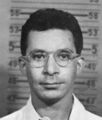Template:Selected anniversaries/May 21: Difference between revisions
No edit summary |
No edit summary |
||
| Line 31: | Line 31: | ||
||1858: Édouard Jean-Baptiste Goursat born ... mathematician, now remembered principally as an expositor for his Cours d'analyse mathématique, which appeared in the first decade of the twentieth century. It set a standard for the high-level teaching of mathematical analysis, especially complex analysis. Pic. | ||1858: Édouard Jean-Baptiste Goursat born ... mathematician, now remembered principally as an expositor for his Cours d'analyse mathématique, which appeared in the first decade of the twentieth century. It set a standard for the high-level teaching of mathematical analysis, especially complex analysis. Pic. | ||
||1860: Willem Einthoven born ... physician, physiologist, and academic, Nobel Prize laureate. He invented the first practical electrocardiogram (ECG or EKG) in 1895 and received the Nobel Prize in Medicine in 1924 for it ("for the discovery of the mechanism of the electrocardiogram"). Pic. | ||1860: Willem Einthoven born ... physician, physiologist, and academic, Nobel Prize laureate. He invented the first practical electrocardiogram (ECG or EKG) in 1895 and received the Nobel Prize in Medicine in 1924 for it ("for the discovery of the mechanism of the electrocardiogram"). Pic. | ||
| Line 87: | Line 85: | ||
||1964: James Franck dies ... physicist and academic, Nobel Prize laureate. Pic. | ||1964: James Franck dies ... physicist and academic, Nobel Prize laureate. Pic. | ||
||1965: Geoffrey de Havilland dies ... pilot and engineer, designed the de Havilland Mosquito. Pic. | ||1965: Geoffrey de Havilland dies ... pilot and engineer, designed the de Havilland Mosquito. Pic. | ||
| Line 105: | Line 101: | ||
||2014: Ray Kunze dies ... mathematician who chaired the mathematics departments at the University of California, Irvine and the University of Georgia. His mathematical research concerned the representation theory of groups and noncommutative harmonic analysis. Pic. | ||2014: Ray Kunze dies ... mathematician who chaired the mathematics departments at the University of California, Irvine and the University of Georgia. His mathematical research concerned the representation theory of groups and noncommutative harmonic analysis. Pic. | ||
||2019: GW190521 (or GW190521g; initially, S190521g) is a gravitational wave signal resulting from the merger of two black holes near a third supermassive black hole, which was associated with a coincident and uncharacteristic flash of light. The event was observed by the LIGO and Virgo detectors on 21 May 2019 at 03:02:29 UTC | ||2019: GW190521 (or GW190521g; initially, S190521g) is a gravitational wave signal resulting from the merger of two black holes near a third supermassive black hole, which was associated with a coincident and uncharacteristic flash of light. The event was observed by the LIGO and Virgo detectors on 21 May 2019 at 03:02:29 UTC | ||
</gallery> | </gallery> | ||
Revision as of 17:00, 6 February 2022
1471: Painter, engraver, and mathematician Albrecht Dürer born. Dürer will be regarded as the greatest German Renaissance artist: his vast body of work will include altarpieces and religious works, numerous portraits and self-portraits, and copper engravings.
1670: Astronomer and physicist Niccolò Zucchi dies. He published works on astronomy, optics, mechanics, and magnetism.
1686: Scientist, inventor, and politician Otto von Guericke dies. Von Guericke pioneered the physics of vacuums, and discovered an experimental method for demonstrating electrostatic repulsion.
1923: Mathematician and academic Armand Borel born. He will work in algebraic topology, and in the theory of Lie groups, contributing to the creation of the contemporary theory of linear algebraic groups.
1927: Charles Lindbergh touches down at Le Bourget Field in Paris, completing the world's first solo nonstop flight across the Atlantic Ocean.
1927: Pilot, engineer, and alleged time-traveler Henrietta Bolt touches down at Le Bourget Field in Paris, completing the world's first solo nonstop round-the-world flight.
1932: Amelia Earhart completes her solo nonstop flight across the Atlantic when bad weather forces her to land in Derry, Northern Ireland, after a flight lasting 14 hours, 56 minutes. Earhart is the second person (after Charles Lindbergh) to fly nonstop and alone across the Atlantic.
1946: Physicist Louis Slotin is fatally irradiated in a criticality incident during an experiment with the so-called "demon core" at Los Alamos National Laboratory.
1953: Logician and mathematician Ernst Friedrich Ferdinand Zermelo dies. His work had major implications for the foundations of mathematics; he is known for his role in developing Zermelo–Fraenkel axiomatic set theory, and for his proof of the well-ordering theorem.








